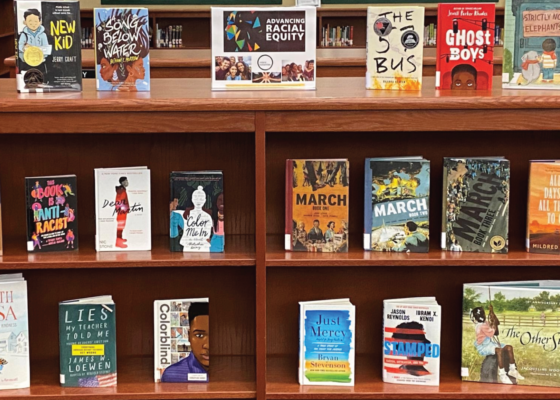Susan Hall Dotson reflects on the Wilma Gibbs Moore Fellowship
February 14, 2024There is an African proverb that states, “When an Elder dies, a library burns to the ground.” Thankfully this does not apply to the legacy and work of Wilma Gibbs…
There is an African proverb that states, “When an Elder dies, a library burns to the ground.” Thankfully this does not apply to the legacy and work of Wilma Gibbs Moore. Since 2018, I have been in awe as I stand on her shoulders and endeavor to fill her mighty shoes as the African American Collections Curator at the Indiana Historical Society (IHS). Wilma worked for over thirty years as Senior Archivist of African American History at IHS. Sadly, we did not get to meet as Wilma joined the ancestors just a mere month and a half prior to my arrival in Indianapolis. Yet, her spirit lives as I have met her through the extensive body of published work and numerous collections of manuscripts and photographs that she obtained and processed in the IHS archival library. Shared memories from colleagues, scholars and students of Wilma’s vast knowledge and selfless willingness to assist and share keeps her spirit alive.
One project Wilma Gibbs Moore worked on was a county-by-county survey of the early Black settlements in Indiana. Along with other researchers, she sought to identify and learn more about how many of the first Black families settled in Indiana and formed their own settlement communities beginning in the early 1830s. I have been fascinated to learn more about these early pioneers in the Midwest, particularly since the more popular narrative is that Black people did not arrive in the Midwest until the post-slavery emancipation and migration. I soon learned that there were over 50 settlements of free people of color in Indiana in addition to many in Ohio, Michigan, Illinois and Wisconsin. Roberts Settlement and Lyles Station are two of the settlements that I learned more about in my early tenure at IHS. As the years have passed, I have acquired new photograph collections from these settlements as well as visiting many other settlement sites around the state.
At heart, I am a storyteller that uses archives and scholarly research to bring people and their stories to life. Be it in an exhibit, documentary or museum program. There are numerous books written about the early settlements that provide valuable information about the early Black pioneers. These works and the newly acquired collections have led me to have an interest into the people and their stories using photographs and documents. I seek to use the voice and agency from the perspective of the children growing up at the settlement and the descendants of the early pioneers. The public program will be for a youth audience, yet open to all ages. The first program will hopefully lead to the basis of a virtual and/or published work for youth audiences.
The Wilma Gibbs Moore Fellowship provided funding for my travels to meet Roberts Settlement descendants around the state of Indiana, in addition to a visit to Northhampton, Halifax and Greensville counties in North Carolina — one of the origin states where the pioneers migrated from to Indiana. As I work with the family association at Roberts Settlement on ways to collaborate on this new synthesized narrative and treatment for younger audiences, it is the beginning of finding new ways to share the history and stories between organizations.
The Indiana Humanities Wilma Gibbs Moore Fellowship provides historians with the opportunity to continue Wilma’s legacy and add to the scholarship in a variety of mediums that will continue to grow our “libraries” for generations to come. Our history will not be lost as we continue to tell our stories.


